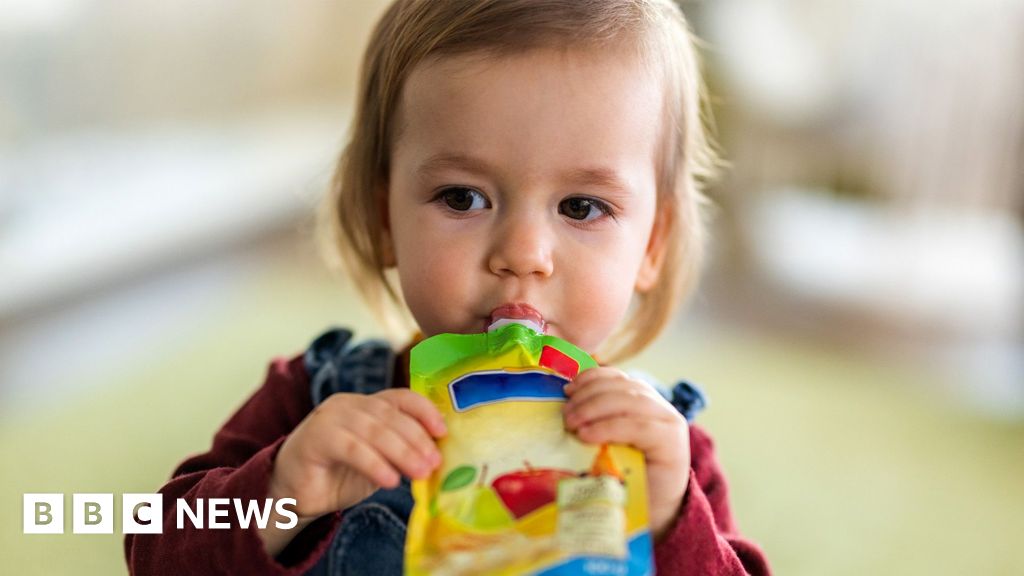ARTICLE AD BOX
By Sarah Toom
BBC Scotland news
Sarah Mullen gave birth to Moses at her home in East Ayrshire
Sarah Mullen is one of a growing number of women in Scotland who are choosing to give birth at home.
Her second child Moses was born in her house in Ochiltree, East Ayrshire, at the end of March.
She opted for a home birth after an unsatisfactory experience with her first labour.
"It just seems like a far more natural process," she says.
"Giving birth isn't an emergency unless it's an emergency. I just wanted to do it the old way."
Sarah lives in the NHS Ayrshire and Arran health board area which has seen home-birth numbers grow from just six in 2017 to 68 last year.
Across all 14 health boards in Scotland the numbers have more than doubled since 2017 from 242 to 581, but they still represent just over 1% of births each year.
Moses was Sarah's second child
Five health boards introduced dedicated home birth teams or "champions" over that period and those which did generally saw the largest growth in the number of children born in houses.
These included NHS Greater Glasgow and Clyde, Lothian, Fife, Tayside and Ayrshire and Arran, where Sarah Mullen was paired up with midwife Kylie Mitchell.
The midwife provided care for weeks in the lead-up to the birth.
Ms Mitchell says: "All women should be offered a choice of home birth, then referred on to us and we chat through whether it's suitable and it's ultimately their decision.
"It's about making sure women know it is an option because I think in the past it was not always known."
Sarah Mullen says she was more comfortable giving birth at home
Having the same midwife provide antenatal, labour and postnatal care is a key feature of the home birth model.
Ms Mitchell says it is great for continuity of care and building trust to make women feel more relaxed - although it is not always possible.
"If women do feel more relaxed at home, they do better," Ms Mitchell says.
And it did go well for Sarah and her baby, with no complications or interventions.
She says: "It was a lot faster than I expected, four and a half hours.
"It was far more comfortable being at home. I was on my bed and it was nice just being in my own environment."
Hospital concerns
The BBC obtained Freedom of Information data from all Scotland's health boards.
Some shared the reasons patients had given for their choice of home birth, which included pandemic-related fears such as contracting Covid-19 in hospital or loved ones being affected by ward visiting restrictions.
Others had more mundane concerns such as wanting to avoid the cost of travelling to hospital, fear of delivering the baby en-route or not being able to find childcare.
Midwife Kylie Mitchell says women should have the choice of a home birth
Like Sarah, some said that their previous birth experience was not satisfactory.
However, Attica Wheeler, associate director of nursing at NHS Ayrshire and Arran, said most of the increase in its area was due to women being given informed choice by both midwives and maternity care assistants in clinics as well as positive feedback from parents.
Jaki Lambert, President of Royal College of Midwives (Scotland), said it was positive to know that women had options around the place of birth.
But she added that the home birth team approach that worked in Ayrshire and Arran, wouldn't necessarily work in a different location.
Traditionally Scotland has a lower home birth rate than the other UK nations - about 1% of births. That's compared with 2.1 % of births in England and Wales in 2020.
The vast majority of health boards in Scotland, stated they had no target for home births, with some exceptions.
NHS Lanarkshire aims to hit 3% by 2023, and NHS Fife is also aiming to increase its figures with the development of its home birth team, established in 2018.
However, doctors have warned that home births are not for everyone.
Dr Alastair Campbell, consultant obstetrician and spokesperson for the Royal College of Obstetricians and Gynaecologists, said healthcare professionals should give impartial and accurate information about the risks and benefits of each birth setting.
He said: "We encourage women who have not given birth before to deliver in a hospital setting and, if low risk, in an adjacent midwifery unit.
"This is due to evidence showing that first-time mothers wishing to deliver at home have a small increased risk of poor outcomes for their babies. Home births are safe for some women."
A Scottish government spokesperson said all women should have an appropriate level of choice in relation to place of birth, including the option of home birth.
Its Best Start plan recommends that health boards should provide the full range of choice for safe place of birth.
The spokesperson said: "Best Start doesn't guarantee home birth, but it is clear that all choices for place of birth should be available to women and care should be tailored to the individual."

 3 years ago
65
3 years ago
65








 English (US) ·
English (US) ·